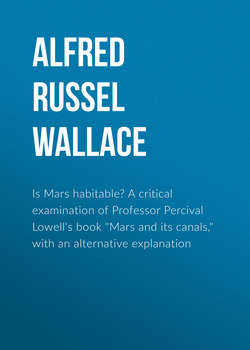Читать книгу Is Mars habitable? A critical examination of Professor Percival Lowell's book "Mars and its canals," with an alternative explanation - Alfred Russel Wallace - Страница 1
PREFACE
ОглавлениеThis small volume was commenced as a review article on Professor Percival Lowell's book, Mars and its Canals, with the object of showing that the large amount of new and interesting facts contained in this work did not invalidate the conclusion I had reached in 1902, and stated in my book on Man's Place in the Universe, that Mars was not habitable.
But the more complete presentation of the opposite view in the volume now under discussion required a more detailed examination of the various physical problems involved, and as the subject is one of great, popular, as well as scientific interest, I determined to undertake the task.
This was rendered the more necessary by the fact that in July last Professor Lowell published in the Philosophical Magazine an elaborate mathematical article claiming to demonstrate that, notwithstanding its much greater distance from the sun and its excessively thin atmosphere, Mars possessed a climate on the average equal to that of the south of England, and in its polar and sub-polar regions even less severe than that of the earth. Such a contention of course required to be dealt with, and led me to collect information bearing upon temperature in all its aspects, and so enlarging my criticism that I saw it would be necessary to issue it in book form.
Two of my mathematical friends have pointed out the chief omission which vitiates Professor Lowell's mathematical conclusions—that of a failure to recognise the very large conservative and cumulative effect of a dense atmosphere. This very point however I had already myself discussed in Chapter VI., and by means of some remarkable researches on the heat of the moon and an investigation of the causes of its very low temperature, I have, I think, demonstrated the incorrectness of Mr. Lowell's results. In my last chapter, in which I briefly summarise the whole argument, I have further strengthened the case for very severe cold in Mars, by adducing the rapid lowering of temperature universally caused by diminution of atmospheric pressure, as manifested in the well-known phenomenon of temperate climates at moderate heights even close to the equator, cold climates at greater heights even on extensive plateaux, culminating in arctic climates and perpetual snow at heights where the air is still far denser than it is on the surface of Mars. This argument itself is, in my opinion, conclusive; but it is enforced by two others equally complete, neither of which is adequately met by Mr. Lowell.
The careful examination which I have been led to give to the whole of the phenomena which Mars presents, and especially to the discoveries of Mr. Lowell, has led me to what I hope will be considered a satisfactory physical explanation of them. This explanation, which occupies the whole of my seventh chapter, is founded upon a special mode of origin for Mars, derived from the Meteoritic Hypothesis, now very widely adopted by astronomers and physicists. Then, by a comparison with certain well-known and widely spread geological phenomena, I show how the great features of Mars—the 'canals' and 'oases'—may have been caused. This chapter will perhaps be the most interesting to the general reader, as furnishing a quite natural explanation of features of the planet which have been termed 'non-natural' by Mr. Lowell.
Incidentally, also, I have been led to an explanation of the highly volcanic nature of the moon's surface. This seems to me absolutely to require some such origin as Sir George Darwin has given it, and thus furnishes corroborative proof of the accuracy of the hypothesis that our moon has had an unique origin among the known satellites, in having been thrown off from the earth itself.
I am indebted to Professor J. H. Poynting, of the University of Birmingham, for valuable suggestions on some of the more difficult points of mathematical physics here discussed, and also for the critical note (at the end of Chapter V.) on Professor Lowell's estimate of the temperature of Mars.
BROADSTONE, DORSET, October 1907.
